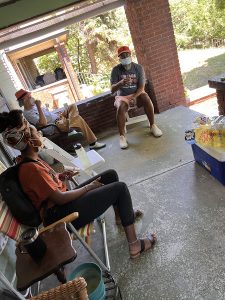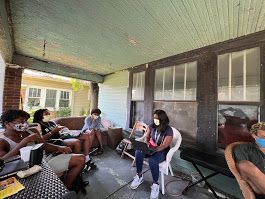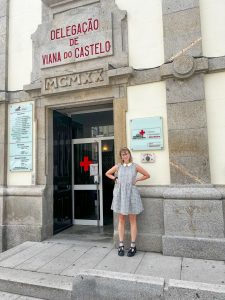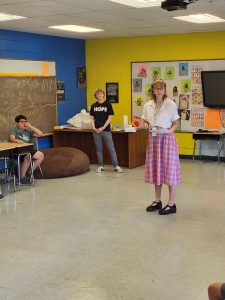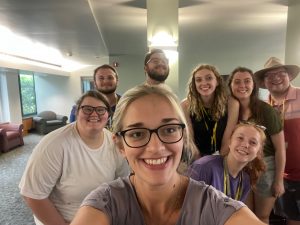 Just as quickly as the first day of Lutheran Summer Music arrived, so did the last day. The morning started off exceptionally rainy, initially making it a gloomy move-out day for LSM students and their families. I spent most of the morning preparing for medication check-out and packing up some of my own belongings as well. Knowing that this would be the last day of LSM, I felt a multitude of emotions: excitement to go home and spend time with my family, fatigue, and general worry about how the day would go. I thought that saying goodbye to students and their families would be a quick process, but I was happily mistaken.
Just as quickly as the first day of Lutheran Summer Music arrived, so did the last day. The morning started off exceptionally rainy, initially making it a gloomy move-out day for LSM students and their families. I spent most of the morning preparing for medication check-out and packing up some of my own belongings as well. Knowing that this would be the last day of LSM, I felt a multitude of emotions: excitement to go home and spend time with my family, fatigue, and general worry about how the day would go. I thought that saying goodbye to students and their families would be a quick process, but I was happily mistaken.
As I met with each student and their families, some of them expressed appreciation that I had not anticipated. One parent expressed gratitude for the time that I spent caring for their student. Another parent wrote me a letter thanking me for my care. Along with the smiles and the many thank-yous that I received from parents, I also received kind feedback from the students that I assisted throughout the past month at LSM. On the way out of the conference room that medication check-out was stationed in, a student paused and said that they looked forward to seeing me next year. Another student asked me if I would be the Health Counselor again next year and said that I was very kind. All of these statements resonated with me.
Although I entered this position with the intent of providing the highest level of care that I could for these students, I did not expect recognition for this. I intended for the month that I spent with LSM to be dedicated to the support of student health and well-being. It is in the job description, yes – but beyond that, it was my way of displaying what I think healthcare is: compassion, care, and taking the time to ask if someone is okay, or, my favorite question, “is there anything that I can do to help you right now?” Despite this, I felt disconnected from the result of my efforts until I received feedback confirming that I helped to provide a healthy, safe environment for the LSM community. I realized that I was doing the work that I had wanted to do, but had been too busy worrying endlessly that I did not have the capability to do it.
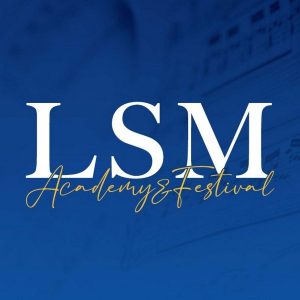 Throughout the duration of my internship with CAPS, I also worried about finding my calling. In fact, I recall feeling behind because I could not identify what my calling was. I even felt that it was possible I couldn’t find it. However, I eventually understood that I would not be able to understand my calling and purpose if I was worrying so much about what it should be. In all honesty, I still cannot explain what my calling or purpose is, but I can confidently tell you that it involves the profession of Nursing, or the caring profession. My calling involves assisting others so that they can feel like their best selves, even if they are experiencing a difficult or shocking health situation. Although I was lost and unsure at most times, my calling placed me exactly where I needed to be.
Throughout the duration of my internship with CAPS, I also worried about finding my calling. In fact, I recall feeling behind because I could not identify what my calling was. I even felt that it was possible I couldn’t find it. However, I eventually understood that I would not be able to understand my calling and purpose if I was worrying so much about what it should be. In all honesty, I still cannot explain what my calling or purpose is, but I can confidently tell you that it involves the profession of Nursing, or the caring profession. My calling involves assisting others so that they can feel like their best selves, even if they are experiencing a difficult or shocking health situation. Although I was lost and unsure at most times, my calling placed me exactly where I needed to be.
If it is possible for you today, I want to encourage you to allow yourself the time to reflect on the hard work that you are doing – and allow yourself to celebrate it. And if you are feeling lost or disconnected from your calling, I will also include a verse that continues to help me through my own uncertainty: “Trust in the Lord with all of your heart and lean not on your own understanding. In all your ways acknowledge Him, and He shall direct thy paths.” Proverbs 3:5-6.
– Isabella Dietrich, Lutheran Summer Music
